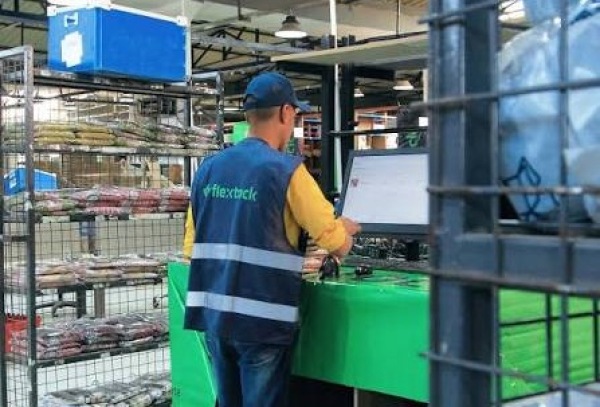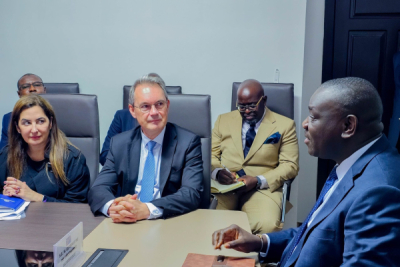- Flextock raised $12.6 million to expand across the Middle East and North Africa.
- The Cairo-based startup provides end-to-end e-commerce logistics services.
- The company plans to scale operations in Saudi Arabia and the United Arab Emirates.
Flextock provides logistics solutions that address persistent fulfillment challenges in the fast-growing e-commerce sector.
The Cairo-based startup launched operations in 2021. Mohamed Mossaad and Enas Siam founded the company to allow online merchants to focus on sales growth while the platform manages backend operations.
Flextock delivers end-to-end supply chain management services. The platform receives and stores inventory, processes orders through picking and packing, and prepares and ships parcels to end customers.
Earlier this month, Flextock secured $12.6 million in a funding round. The company said it will use the proceeds to strengthen its technology and accelerate expansion across the Middle East and North Africa region. The company specifically targets growth in Saudi Arabia and the United Arab Emirates.
The platform integrates directly with merchants’ online stores. The system provides real-time visibility into inventory levels and order status. The company also offers customized dashboards that track key performance indicators.
Flextock operates on an on-demand warehousing model. The company does not require minimum storage commitments. This structure allows both B2C and B2B merchants to scale operations in line with demand.
The company extends its services beyond traditional logistics. Flextock aggregates last-mile delivery providers, manages cross-border exchanges, and offers cash management solutions. The platform addresses operational constraints that e-commerce businesses face in fragmented regional markets.
Flextock processes several hundred thousand orders per month. The company maintains high order accuracy rates and positions itself as a strategic outsourcing partner for brands seeking greater efficiency and responsiveness in digital commerce.
This article was initially published in French by Adoni Conrad Quenum
Adapted in English by Ange J.A de Berry Quenum
- Orange executives say digital transformation strengthens competitiveness for Ivorian companies.
- Cyberattacks on Ivorian SMEs reached 2.8 million incidents in 2022, up more than 39% year-on-year.
- Orange Business CI offers cybersecurity diagnostics, penetration testing and managed security services to address rising risks.
Digital transformation now represents a strategic lever of competitiveness for Ivorian companies. Executives delivered that message during the 20th edition of “Orange Business Live,” which took place on Feb. 19 under the theme “Innovation and Digital Transformation: Accelerating the Competitiveness of Ivorian Companies.”
Pacôme Boidi, senior manager for B2B coordination, and Fitzgerald Bony, deputy director of B2B operations at Orange CI, led the event.
Executives said digital solutions improve productivity, lower operating costs and optimize internal processes. They urged local companies to integrate innovation into their core strategies to strengthen their positioning in an increasingly competitive market.
However, Fitzgerald Bony said companies must adapt digital priorities to sector dynamics. He said the absence of digital tools does not necessarily penalize companies in the short term if competitors have not adopted them. He added that companies must align with digital standards in sectors where competitors already use such tools to preserve competitiveness.
Pacôme Boidi stressed that global connectivity has expanded competition beyond national borders. “The competition is on. Know your industry, dare to take the plunge, and get involved in transformative projects. Try to be that strategic compass, and remember that Orange is here to support you,” he said.aid, addressing Ivorian businesses.
Digital Transformation Challenges: Human Factor and Cybersecurity
Speakers said managerial alignment and change management determine the success of digital transformation projects. They said companies must define a clear strategic vision and demonstrate strong leadership to sustain transformation efforts. They said value depends not on the tool itself but on its ability to address a concrete and priority business need. They recommended a gradual approach supported by quick and measurable results to secure staff engagement.
Speakers also highlighted the role of young graduates in the evolving ecosystem. They said training, startup support and continuous skills development strengthen competitiveness. They said massive open online courses (MOOCs), university partnerships and structured internships can build a more resilient digital ecosystem.
However, executives acknowledged that digitalization exposes companies to new cybersecurity risks. In a study published in October 2025, Orange Business CI said small and medium-sized enterprises face heightened exposure to cyberattacks. The study said more than 27,500 Ivorian SMEs suffered 2.8 million cyberattacks in 2022, which marked an increase of more than 39% compared with the previous year. The study said 81% of SMEs have never provided or received cybersecurity training, while 66% never discuss cybersecurity at board level.
In 2024, National Information Systems Security Agency recorded more than 12,100 cybercrime cases. The agency said cybercrime has increased steadily for several years. The agency said threats affect individuals, companies, local authorities and state institutions. The agency said cybercriminals exploit accelerated digital transformation, weak cybersecurity culture and the growing use of smartphones, connected devices and online services.
Against that backdrop, Orange Business CI offers cybersecurity tools that cover multiple layers of corporate protection. The company provides assessment services such as cyber diagnostics, which identify organizational and technical vulnerabilities and define action plans. The company also provides “pentest” services that conduct technical intrusion tests and deliver detailed audit reports.
The company complements those services with operational solutions. The offer includes a managed security services provider (MSSP) cloud platform that secures internet access, mobile threat protection (MTP) tools, a server and workstation monitoring and incident response solution (MicroSOC), and a mobile device management (MDM) service that controls and secures professional data on smartphones. The company said the integrated approach addresses the diversification of cyber risks facing businesses.
This article was initially published in French by Isaac K. Kassouwi
Adapted in English by Ange J.A de Berry Quenum
- Senegal will equip traffic regulation units with 2,500 body cameras.
- Authorities will link the devices to digital ticketing systems to curb cash handling and improve fine collection.
- The government aims to reduce corruption and strengthen traceability of roadside interventions.
Senegal will equip its traffic regulation units with 2,500 portable cameras to strengthen oversight of roadside checks and reduce corruption, Interior Minister Mouhamadou Bamba Cissé said.
The minister announced the measure on Feb. 18 before the National Assembly during the review of a draft law aimed at professionalizing the private security sector.
Cissé said the body cameras will record interactions between officers and road users. He said the recordings will provide factual evidence in the event of disputes and improve traceability of public road interventions. He said authorities aim to improve operational practices and enhance service quality for citizens.
Modernizing Road Control Through Digital Tools
Authorities will connect the body cameras to personal digital assistants (PDAs) that the ministry already uses to manage traffic fines and dematerialize procedures. Officials said the integration will standardize the processing of infractions, limit cash handling and ensure direct payment of fines to the public treasury. Authorities said the system will strengthen financial flow management and improve transparency.
The project forms part of a broader modernization drive within the security forces. The administration has introduced digital tools in recent years to manage traffic and roadside controls. Officials said mobile technologies will improve operational efficiency and strengthen the reliability of infraction data collection.
A Technology Already Tested in Several Countries
Security services across North America and Europe have widely adopted body cameras as tools that support procedures and evidence management. Several studies conducted in those regions show improved compliance with protocols during checks and reduced incidents linked to interventions.
In Africa, South Africa launched a program in 2023 to equip selected police and traffic officers with body cameras to improve monitoring of interventions. Nigeria and Kenya have also initiated discussions on integrating such devices into public security systems.
Senegal’s decision to combine body cameras and PDAs signals an effort to align technological innovation with administrative reform. Authorities said they will link the devices to a digital infraction management circuit to strengthen procedures, optimize fine collection and modernize the operational environment of security forces.
Officials said the system’s effectiveness will depend on officer training, a clear legal framework governing the use of recordings and the integration of the technology into a coherent management structure. Policymakers in other countries that adopted similar solutions have faced similar implementation challenges.
This article was initially published in French by Samira Njoya
Adapted in English by Ange J.A de Berry Quenum
- The government operationalized $500 million to support digital development.
- Authorities will prioritize broadband infrastructure and public service digitalization.
- The national digital plan targets $1 billion in public investment over 2026–2030.
The government of the Democratic Republic of the Congo said it operationalized $500 million in financing to accelerate digital development as part of its national strategy.
Officials announced the measure on Feb. 17 after a working session chaired by Digital Economy Minister Augustin Kibassa Maliba with a high-level delegation of experts from the World Bank and the French Development Agency.
The Ministry of Digital Economy said technical assistance programs are nearing completion to launch investments around two priority pillars.
The first pillar focuses on strengthening digital infrastructure. Authorities plan major works to connect the country’s main cities to high-speed broadband networks. The government aims to improve service quality and significantly reduce internet access costs for the population.
The second pillar targets public service digitalization and skills development. Authorities will prioritize the dematerialization of civil registry services to simplify administrative procedures and improve the reliability of public data. The program will also include training and capacity-building initiatives to support administrative transformation and enhance employability in digital professions.
The announcement follows the signing in June 2025 of financing agreements totaling $1.9 billion with the World Bank, including $400 million specifically allocated to the digital sector. The European Union has also committed €100 million, equivalent to about $117.5 million, to support the country’s efforts.
The financing forms part of broader efforts to implement the national digital transformation strategy, which authorities consider a lever for socio-economic development. To support the National Digital Plan 2026–2030 (PNN2), which the government launched in October 2025, the administration plans $1 billion in public investment over five years. Authorities have already mobilized $500 million in external support from international partners and continue to explore additional financing partnerships.
According to the GSMA, digital technologies could contribute about $4.1 billion to the Congolese economy by 2029 if the country invests heavily in key sectors such as industry and agriculture. However, the country currently ranks 179th out of 193 economies in the United Nations E-Government Development Index. The country remains below the averages for Central Africa, Africa and the global benchmark.
This article was initially published in French by Isaac K. Kassouwi
Adapted in English by Ange J.A de Berry Quenum
- Sympl offers interest-free “buy now, pay later” services across a wide merchant network.
- The fintech allows customers to split payments without traditional banking procedures.
- Founder Mohamed El-Shabrawy El-Feky brings experience from Bank Audi, Mashreq Bank and EFG Hermes.
Mohamed El‑Shabrawy El‑Feky is positioning installment payments as a mainstream purchasing habit in Egypt through his fintech venture Sympl.
El-Shabrawy El-Feky co-founded Sympl and serves as chief executive officer. The startup offers a “buy now, pay later” (BNPL) solution that allows customers to split purchases into multiple installments without additional fees or interest.
Founded in 2021, Sympl targets both individual consumers and businesses. The company aims to simplify purchasing decisions and widen access to products and services without relying on traditional banking channels.
The platform operates through a staggered payment system. Customers divide the purchase amount into several installments. At checkout, customers select Sympl without submitting a formal credit application or providing extensive documentation.
Sympl spreads payments over a defined period with weekly, biweekly or monthly installments. The company states that it charges no interest, which means customers repay only the original purchase price without additional financial costs.
The platform provides a payment simulator that estimates installment plans based on the selected amount and duration. The simulator displays the number of payments and the frequency of deductions. The company notes that actual amounts may vary slightly, which indicates some adjustment margin around the projected figures.
El-Shabrawy El-Feky graduated from Cairo University in 2001 with a bachelor’s degree in urban planning and landscape design. He earned a master’s degree in marketing in 2006 from the Arab Academy for Science, Technology and Maritime Transport.
He began his career in 2002 at Fiat Professional as a marketing manager. He joined Bank Audi in 2007 and held roles including sales team leader, sales supervisor, assistant sales manager and product manager until 2013. He then moved to Mashreq Bank as product manager before returning to Bank Audi in 2015 as segment head director.
In 2017, he joined EFG Hermes as head of product development. He moved in 2018 to valU, where he served first as commercial director and later as chief executive officer before launching Sympl.
This article was initially published in French by Melchior Koba
Adapted in English by Ange J.A de Berry Quenum
- Kenza Lahlou co-founded Outlierz Ventures to fund early-stage African tech startups.
- The firm invests from launch phase through pre–Series A rounds.
- Portfolio companies include PayTic, Kashier and Socium.
Kenza Lahlou directs investment toward early-stage African technology startups through Outlierz Ventures, the firm she co-founded and manages, positioning innovation as a catalyst for economic transformation while backing entrepreneurs from the idea stage onward.
Founded in 2017, Outlierz Ventures focuses on startups that use technology to transform key sectors of the African economy. The firm aims to back founders who tackle structural challenges while shaping the continent’s long-term growth trajectory.
The firm invests at a very early stage, often during the launch phase when projects remain in their infancy. The firm continues to support companies through subsequent milestones before major fundraising rounds. This approach allows the firm to influence strategic decisions at formative stages.
Outlierz Ventures provides capital, operational guidance and access to a professional network. The firm seeks to help founders navigate African market realities and accelerate expansion. Portfolio companies include PayTic, Kashier and Socium.
Before launching Outlierz Ventures, Lahlou co-founded StartupYourLife in 2014 and served as chief executive officer until 2018. The nonprofit identifies, connects and supports seed and early-stage startups in Morocco.
Lahlou graduated from INSA Rouen Normandie in 2010 with a bachelor’s degree in computer science. She earned a master’s degree in strategy and international business management in 2011 from ESSEC Business School in Singapore.
She began her career in 2009 at Xerox Research Centre Europe as product manager and quality controller. She joined the Singapore Agency for Science, Technology and Research in 2011 as strategy consultant. Later that year, she joined Attijariwafa Bank in Morocco as financial analyst.
In 2012, she became strategy and business development specialist at AVISE Partners, a U.S.-based advisory firm focused on financing. Between 2013 and 2014, she served as head of Africa partnerships at Viadeo, a French company specializing in recruitment-related services.
This article was initially published in French by Melchior Koba
Adapted in English by Ange J.A de Berry Quenum
- Sirius Skills launched in 2025 to address Ghana’s digital skills gap.
- The platform offers employer-aligned programs in data analysis, project management and digital fundamentals.
- Founder Ariel Garraway says the model emphasizes hands-on deliverables and direct employer engagement.
Sirius Skills has launched an online learning platform that targets Ghana’s widening digital skills gap as labor market demand outpaces supply.
Founder Ariel Garraway launched the startup in 2025 to bridge the divide between traditional education systems and evolving employer requirements.
The platform offers structured training programs that address current market needs. The curriculum focuses on high-demand fields such as data analysis, project management, leadership and foundational digital skills.
Sirius Skills differentiates itself through a practical learning model. The platform prioritizes deliverables and job-ready competencies over purely theoretical instruction. Learners complete applied projects throughout their training, which supports professional integration or career progression.
“Learners also participate in a structured community environment that reinforces accountability and collaboration. This setup mirrors real-world working conditions and helps employers assess readiness beyond technical knowledge alone.” Garraway said.
The company also positions the platform as a bridge between employers and available talent. Sirius Skills works with companies to identify internal skills gaps and designs tailored learning pathways. The company says this approach reduces onboarding costs and strengthens organizational innovation capacity.
“We are actively conducting interviews with employers across Ghana to align our training program with the skills they are looking for. Our training is designed to meet real recruitment expectations,” the startup said.
African and global economies are accelerating digital transformation efforts. Sirius Skills seeks to address one of the sector’s most pressing constraints: building a workforce that meets current and future technology market demands.
This article was initially published in French by Adoni Conrad Quenum
Adapted in English by Ange J.A de Berry Quenum
Egyptian e-commerce platform Breadfast has raised $50 million in pre-Series C funding from regional and international investors, including Mubadala Investment and SBI Investment. The funds will be used to strengthen its logistics infrastructure and support expansion into new African markets. Originally launched as a bread delivery service, the company has since diversified into groceries, pharmacy products and payment services.
Nigerian fintech Risevest, which enables users to invest in dollar-denominated assets, has secured a fund and portfolio management license from Nigeria’s Securities and Exchange Commission (SEC). The license was issued to its subsidiary, RV Fund Management, following months of regulatory review. The approval resolves uncertainty stemming from a 2025 public warning by the regulator over the company’s unlicensed status.
Applications are now open for the tenth edition of the App Africa Challenge, themed “Tech for a Cleaner World.” The competition is open to Francophone African entrepreneurs with high-potential digital projects. Candidates have until Saturday, February 28, 2026, to apply on the official App Africa Challenge website.
More...
- Internet shutdowns cost sub-Saharan Africa $1.11 billion in 2025, according to Top10VPN.
- Governments imposed 24,276 hours of disruptions, affecting 116.1 million users across the region.
- The Democratic Republic of Congo, Sudan, and Cameroon recorded the highest economic losses.
Internet shutdowns and platform restrictions cost sub-Saharan Africa $1.11 billion in 2025, according to the Global Cost of Internet Shutdowns report published by Top10VPN. Globally, such disruptions generated $19.7 billion in losses, highlighting a growing scale of digital interference.
In sub-Saharan Africa, 2025 losses declined from $1.56 billion in 2024, but the financial impact remained significant. Authorities enforced shutdowns for 24,276 hours, and the disruptions affected 116.1 million internet users. Governments implemented most restrictions during elections, protests, school examinations, and military coups.
Most affected countries
The Democratic Republic of the Congo recorded the highest losses in Africa, with $67.2 million in economic damage. Authorities disrupted connectivity for 1,008 hours, affecting 34.7 million users.
Sudan reported $66.6 million in losses over 2,148 hours of shutdowns, despite affecting a smaller number of users estimated at 14.9 million. The duration of the interruptions amplified the economic impact.
Cameroon incurred $40.5 million in losses, as authorities disrupted access for 52 hours, affecting 12.6 million users.
Governments frequently targeted social media platforms such as Twitter, Telegram, TikTok, Facebook, and WhatsApp. Authorities used these restrictions to limit communication, commerce, and access to information. In some cases, governments imposed intentional slowdowns that made multimedia content and live broadcasts nearly inaccessible.
How are these losses calculated?
The report said analysts calculated the economic cost of shutdowns using the Netblocks Cost of Shutdown Tool, developed by Netblocks and based on a methodology designed by the Brookings Institution, adapted for sub-Saharan Africa.
Analysts estimated losses using digital GDP, disruption duration, and the number of affected users. Researchers sourced data from the World Bank and official government statistics. The report said analysts applied social media restrictions to the entire internet user base because platform bans disrupt overall access, including for users who do not actively use blocked services.
A major obstacle to digital transformation
These losses illustrate the economic cost of internet shutdowns across sub-Saharan Africa. As governments invest in digital transformation to close development gaps, deliberate connectivity disruptions continue to undermine innovation and competitiveness.
Shutdowns also reduce revenues for telecom operators, digital-dependent businesses, and households, and they limit growth potential in an increasingly connected global economy.
In a statement published in January 2026, UNESCO said access to the internet represents a pillar of freedom of expression and a core component of democratic participation. The organization urged governments to adopt policies that promote connectivity rather than impose restrictions.
Samira Njoya
- South African entrepreneur Bonga Lamula co-founded Beqy.ai to automate corporate financial management.
- Founded in 2023, Beqy.ai uses artificial intelligence to centralize accounting, reporting, and financial forecasting.
- The platform targets executives and finance professionals seeking real-time, reliable financial data for faster decision-making.
Bonga Lamula is a South African entrepreneur and an expert in artificial intelligence and digital transformation. He serves as co-founder and chief executive officer of Beqy.ai, an online platform that helps companies manage their finances by automating accounting processes and financial monitoring.
Founded in 2023, Beqy.ai aims to transform how companies track revenues, expenses, and forecasts. The platform seeks to provide executives and finance professionals with continuous access to reliable data in order to support rapid decision-making and reduce risks linked to weak financial visibility.
Beqy.ai centralizes several core functions within a single interface, including transaction tracking, report preparation, analysis, and forecasting. The platform automates the production of monthly financial reports and key performance indicators, which reduces manual workloads and limits human error.
The solution also offers dashboards that allow companies to visualize performance, identify trends, and quickly detect risk signals such as rising costs or declining cash flow. The platform integrates analytical tools that help users understand changes in revenues, expenses, loan repayments, and other significant financial movements.
Bonga Lamula earned a bachelor’s degree in commerce in 2013 and a bachelor’s degree in economics in 2014 from the University of Zululand. He later obtained a master’s degree in finance in 2023 from Corvinus University of Budapest.
He completed a risk analyst internship in 2015 at the South African Reserve Bank. He then joined Bank of America Merrill Lynch in South Africa in 2016 as an investment strategist.
From 2017 to 2020, he worked at Anheuser-Busch InBev, where he successively held roles as supply projects specialist, Africa procurement manager, and digital transformation manager. From 2022 to 2024, he served as digital transformation manager at Tesco Business Solutions in Budapest.
This article was initially published in French by Melchior Koba
Adapted in English by Ange J.A de Berry Quenum
- Burundi launched a web-based single window to manage import permits and online payments.
- The platform integrates pharmaceutical controls through the ABREMA module and connects multiple regulators.
- Authorities made the system mandatory as part of customs and public-sector digital reforms.
The Burundi Revenue Authority (OBR), with support from TradeMark Africa and the United Nations Conference on Trade and Development, presented the new web-based version of the Electronic Single Window for import permit management on February 17, in Bujumbura.
The system now includes the ABREMA module, which covers pharmaceutical and medical products.
Ce mardi 17 février 2026, l’@OBR_BI a procedé à la mise en production et exploitation definitive du module web #ABREMA, une plateforme numérique dédiée à la facilitation de l’importation des produits médicamenteux via le guichet unique électronique.https://t.co/JFCxqmPTRx pic.twitter.com/grqyGfB9gU
— Office Bdais des Recettes (@OBR_BI) February 17, 2026
The platform allows importers and exporters to submit applications, track file progress in real time, and complete payments online without physical travel. The system operates as an integrated platform that centralizes procedures with the Burundian Medicines and Food Regulatory Authority, which oversees pharmaceutical quality and compliance, the Ministry of Environment, Agriculture, and Livestock for sanitary and phytosanitary certifications, and the OBR for final authorization clearance.
The platform features an interactive dashboard that enables users to monitor application status at any time and automatically calculate fees, including options for foreign-currency payments.
Authorities aligned the modernization with Burundi’s public-sector digital transformation policy, which seeks to shorten administrative delays, strengthen trade traceability, and enhance national competitiveness. The reform also extends ongoing efforts to integrate the single window with the ASYCUDA customs system as part of the transition toward a Single Customs Territory.
Authorities made use of the platform exclusive, and all pharmaceutical importers must now complete procedures through the electronic system.
The digital single window also improves coordination between regulatory agencies and businesses while supporting reforms aimed at integrating Burundi into a regional single customs territory. Countries such as Rwanda, Kenya, Uganda, and Zimbabwe also operate electronic single windows interconnected with online customs systems.
The ASYCUDA WORLD system, developed with UNCTAD support, operates in more than 100 economies and helps reduce customs clearance times and administrative costs.
This article was initially published in French by Samira Njoya
Adapted in English by Ange J.A de Berry Quenum
- South African entrepreneur Jason Van Dyk co-founded Sociable to promote in-person social experiences.
- The mobile app helps users find, organize, and host local events and community activities.
- The platform launched publicly in Durban in 2022 after being founded in 2020.
Jason Van Dyk operates as a South African entrepreneur. He co-founded and leads Sociable, a mobile application dedicated to events and communities. The platform helps users find, organize, and experience real-world activities with people around them.
Founded in 2020 and publicly launched in Durban in 2022, Sociable aims to simplify access to activities and outings while encouraging authentic connections through shared experiences. The application targets users who want to attend events, build communities, or meet people with similar interests.
The platform operates through a live activity feed that highlights events and activities near the user or in selected locations. The feed prioritizes what happens “here and now,” and it filters out outdated or overly theoretical content to focus exclusively on accessible, real-life experiences.
Beyond event discovery, Sociable allows users to create and manage their own events. Hosts define each event’s identity by adding a title, a clear description, and visual elements that convey the atmosphere and tone of the proposed experience.
Jason Van Dyk graduated from IIE Varsity College in 2018 with a bachelor’s degree in business administration and management. After graduation, he joined Polar Star Management in 2019 as a junior strategy analyst. He later joined Alliance Enterprise Consulting the same year, where he worked as an SAP consultant until 2022.
This article was initially published in French by Melchior Koba
Adapted in English by Ange J.A de Berry Quenum















